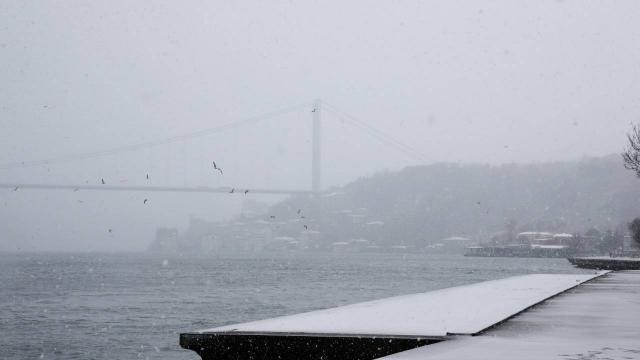
Two prominent experts have come face to face with each other in a debate of intriguing questions after one of the experts made a prediction that the Bosphorus Strait would experience a “mini ice age” situation in two years while the other expert dismissed it by saying it was “out of the question.”
“The Istanbul Strait will experience frost in 2022, 2023, or 2024. We will pass the strait by walking on the icy sea,” said Professor Doğan Yaşar, the head of Dokuz Eylül University’s Marine Science Technology Institute, on Feb. 26.
The statement by Yaşar received a strong reaction from another expert, Professor Levent Kurnaz, from Boğaziçi University in Istanbul.
“Frost in the Istanbul Strait? Out of the question, irrelevant. Besides, Istanbul will not experience heavy snowfall anytime soon,” Kurnaz, the head of the Center of Climate Change and Policy studies in the university, told Demirören News Agency.
Yaşar based his claims on the risk of a coming global cooling, other than global warming.
“Like years in the 900s, we will experience the same global cooling in 2022, 2023, or 2024. Earth will experience a short break from global warming. During this break, we will see the Istanbul Strait freezing,” Yaşar said.
“People walked on the frozen sea of the Istanbul Strait in 1929. In two or three years, I expect to see that scene again,” he added.
He also underlined that global cooling would bring situations of global drought, and the country should take the measures beforehand.
Yaşar’s statements led to a social media hype, and many social media users posted some old photos from 1929 and 1954 showing the icy Bosphorus with people walking on it.
In the mentioned years, 1929 and 1954, the Danube River in Central Europe froze, leading to blocks of ice floating down to the Istanbul Strait, filling the Bosphorus. People then, taking advantage of the situation, walked on the frozen strait.
Kurnaz dismissed Yaşar’s statements on Feb. 27, saying, “The last time the Istanbul Strait froze was in the year 1650. While Earth is facing global warming, it is out of the question that it will freeze again in just two to three years.”
Finding the claims by Yaşar irrelevant, Kurnaz said: “Earth cannot release the energy it gets from the Sun out of its atmosphere. That’s why Earth is warming. So, how can someone say that it will cool in such a short period?”
Noting that the density of snowfall in Istanbul has decreased over the years, Kurnaz said: “The city has not experienced heavy snowfall over the last decade. Besides, the frequency of the precipitation is decreasing, and it rarely snows.”
“In the coming years, there will be less snow. We will not be able to see snow in Istanbul after 2050.”
Taking his claims a step further, he said, “We will only be able to witness snow in Turkey’s east at the end of this century.”